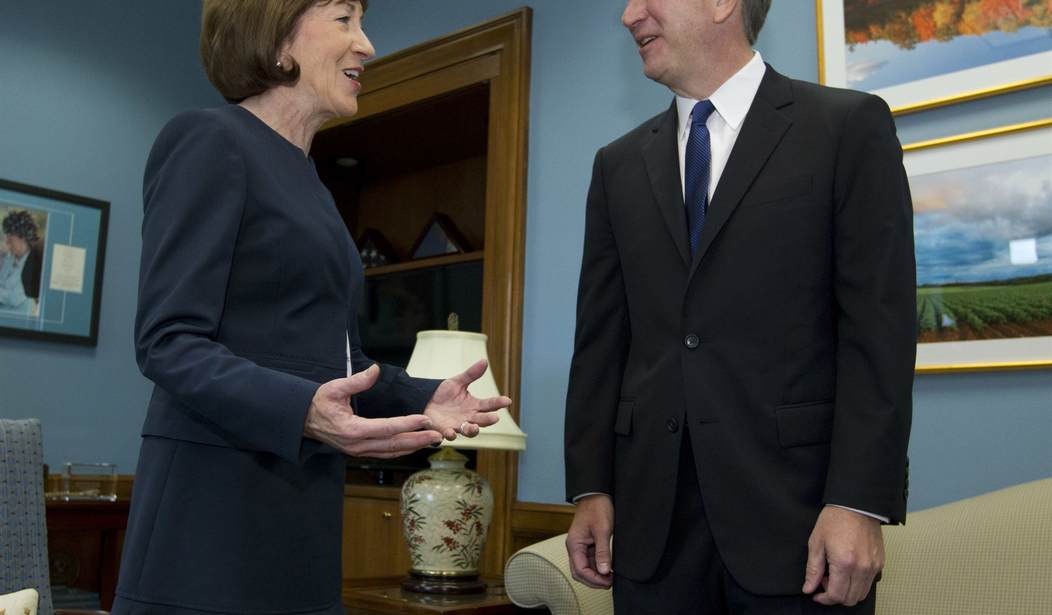Susan Collins said she needed the weekend to process her thoughts on Brett Kavanaugh’s confirmation, but progressives in Maine have one last pitch to make. A crowdfunding effort launched in August to oppose Collins’ re-election has raised close to $900,000, and they’re promising to deploy it if she votes to confirm Donald Trump’s nominee to the Supreme Court:
In mid-August, liberal activists started a crowdfunding campaign that aimed to raise $500,000 for Collins’s Democratic challenger in 2020 — a sum that it pledged to return to donors if the incumbent Republican votes “no” on Brett Kavanaugh’s nomination.
As of this writing, that campaign has raised more than $878,000.
Watch the video that goes along with the crowdfunding, complete with “you’re voting to kill me” histrionics, and see if you can spot the flaw in the argument:
Actually, this argument has two basic flaws, apart from the nonsensical hyperbole used in support of it. First, these progressive groups will almost certainly fundraise and campaign against Collins even if she does vote against Kavanaugh. They’re going after Democrats in this cycle, including Dianne Feinstein in California, where a progressive challenger will face her in the general election thanks to the Golden State’s all-in primary system. (More on that later.)
Second, while $900K sounds like a lot of money, it’s not all that significant in modern Senate campaigns. Even some House races are spending several times that amount in this cycle, and Senate races always run costlier, even in smaller states like Maine. It’s not nothing either, but again, it’s likely to be money that would have been spent against Collins anyway. In watching the video and the rhetoric used in it, do any of these women sound as though they’d be likely to vote for Collins in any circumstance, or to refrain from contributing against her? Pfft.
At least as of today, though, Collins is still keeping her options open. The Roe argument didn’t appear to move her, but Collins did suggest that she’s concerned over Kavanaugh’s honesty in response to a question in his hearing:
When asked about a controversy regarding whether Kavanaugh lied under oath during his 2004 confirmation hearing to be a judge on the D.C. Circuit Court, Collins said she wasn’t aware of the issue. Democrats are charging that Kavanaugh lied about whether – while working for the Bush administration in 2003 – he handled the “vetting process” for another judge, appeals court Judge William Pryor. Kavanaugh said he wasn’t involved in the process during his 2004 confirmation hearing, but newly surfaced emails from that time suggest that he was.
Collins said she would examine the issue this weekend.
“If in fact (Kavanaugh) was not truthful, then obviously that would be a major problem for me,” Collins said.
That’s a nonsense charge too, however, as David French explained on Friday. The allegation of dishonesty is itself dishonestly based on stripping Kavanaugh’s response of both context and his broader testimony:
In an extended Twitter thread, the founder and former managing editor of Above the Law, David Lat, thoroughly dismantled Mystal’s claim. It turns out that Kavanaugh’s testimony was far more extensive than the single sentence Mystal cited. Given the full context, once can clearly see that Kavanaugh was telling the truth.
As Lat explains, different lawyers in the White House counsel’s office were assigned different circuits as their “portfolio.” Kavanaugh explained at his hearing that he was not assigned the Pryor nomination — so he wasn’t “handling” Pryor’s confirmation. But, even then, Kavanaugh said in his testimony that he participated in the process …
So, in context, the meaning is plain: The Pryor nomination wasn’t his to handle, but he did assist in some ways. It’s right there, in black and white.
The same is true about Kavanaugh’s understanding of the source of what turned out to be purloined memos between Senate Democrats on strategizing to block Miguel Estrada’s confirmation to the appellate circuit:
Writing in Slate, Lisa Graves also claimed that Kavanaugh should be “impeached, not elevated” for supposedly perjuring himself. She argued that the judge deliberately lied when he testified he did not see any information stolen from Democrats by former GOP Senate aide Manuel Miranda in the early 2000s. Here’s the relevant portion of Kavanaugh’s testimony:
“I don’t know what the universe of memos might be, but I do know that I never received any memos, was not aware of any such memos.”
Graves claimed that Kavanaugh actually did receive information she believes “plainly” came from stolen Democratic talking points. Perjury, right? Not so fast. Even a panel of experts convened by Vox threw cold water on Graves’s legal theory. There is a long distance between an inaccurate statement and the kind of willful, deliberate falsehood that constitutes a federal crime. Brooklyn law professor Miriam Baer said that “she didn’t see any lie” in Kavanaugh’s response. He simply testified that he didn’t realize the material was stolen.
Collins will likely milk this for all it’s worth, but there isn’t any angle for voting against Kavanaugh that didn’t exist before his confirmation hearing. If Collins felt comfortable voting for him before last week, and she claimed to be leaning in that direction, then she’ll be comfortable voting for him when the time comes after his performance last week, too. The same goes for Lisa Murkowski, who faces similar activist protests in Alaska. It’s just a question of finding the best time to make that clear.








Join the conversation as a VIP Member